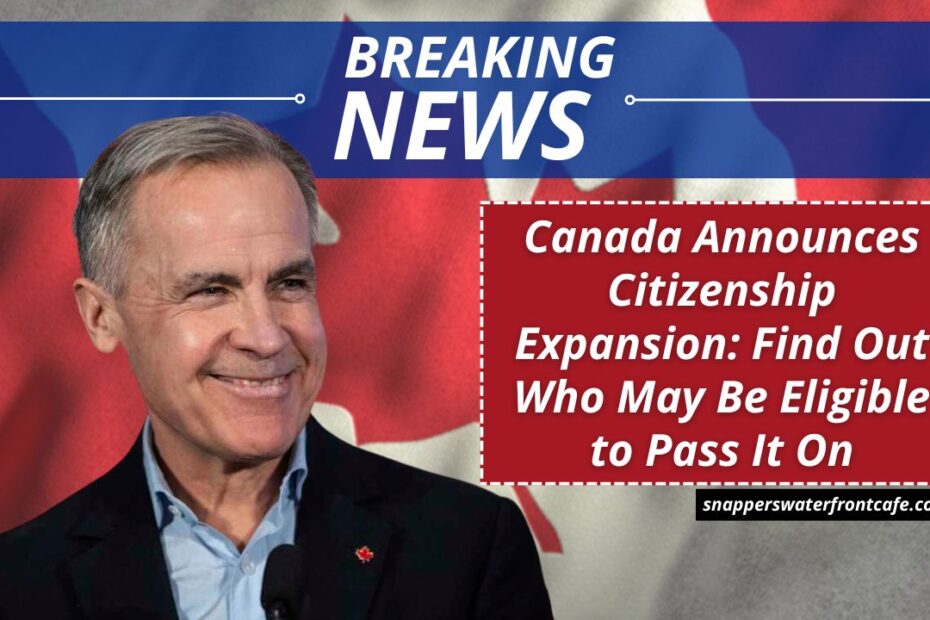Canada is preparing to make significant changes to its citizenship rules, expanding the number of people eligible to pass Canadian citizenship to future generations.
This move aims to strengthen the connection between Canadians abroad and the country while streamlining processes for families, ensuring that more individuals can claim Canadian nationality.
Here’s an in-depth look at the new citizenship expansion, including eligibility, process, key figures, and what it means for Canadians worldwide.
Overview of Canada’s Citizenship Expansion Plan
The Canadian government has unveiled plans to expand citizenship eligibility, particularly for children born abroad to Canadian parents. Previously, individuals born outside Canada to Canadian parents were limited in their ability to pass on citizenship beyond the first generation.
The new changes will allow more generations born abroad to claim Canadian citizenship, increasing opportunities for Canadian families living internationally.
This initiative reflects Canada’s commitment to maintaining a global Canadian community, acknowledging the growing number of Canadians residing outside the country due to work, education, or family reasons. The expansion aims to simplify citizenship claims and strengthen national identity among Canadians worldwide.
Who Will Benefit from the New Citizenship Rules?
Under the existing laws, Canadian citizenship could be passed only to the first generation born abroad. For example, if a Canadian parent had a child outside Canada, that child could claim Canadian citizenship.
However, if that child later had children outside Canada, those grandchildren could not automatically claim citizenship.
With the new expansion:
- Second-generation children born abroad may now have pathways to citizenship eligibility.
- Canadian parents living abroad can apply for citizenship for their children without restrictions imposed by generational limits.
- Individuals with Canadian heritage through grandparents may also qualify under specific conditions outlined in the new legislation.
This change will impact thousands of Canadian families worldwide, particularly in countries with large expatriate communities such as the United States, the United Kingdom, Australia, and parts of Europe.
Eligibility Criteria for the Expanded Citizenship
The Canadian government has outlined several eligibility factors for the expanded citizenship rules. Key eligibility points include:
| Eligibility Factor | Details |
|---|---|
| Parent Citizenship | At least one parent must be a Canadian citizen at the time of the child’s birth. |
| Generation Limit | Expansion may cover second-generation children born abroad, subject to regulations. |
| Residency Requirements | In certain cases, parents may need to demonstrate ties to Canada, such as prior residency or active participation in Canadian life. |
| Application Process | Parents must submit documentation proving citizenship, including birth certificates, passports, and proof of Canadian parentage. |
| Citizenship Fees | Applicants may need to pay fees for processing; fee waivers may apply for certain applicants under specific programs. |
These criteria ensure that while citizenship becomes more accessible, the integrity of Canadian nationality is maintained.
Key Figures and Implications
The Canadian government anticipates that this citizenship expansion could benefit thousands of families abroad, especially in regions with high Canadian expatriate populations. Estimates suggest:
- Over 150,000 Canadians living abroad may have children who will now qualify for citizenship under the new rules.
- This policy change may result in an increase in citizenship applications by approximately 25-30% in the next five years.
- Expanding citizenship also strengthens Canada’s diaspora engagement, encouraging Canadians abroad to maintain cultural and economic ties to Canada.
Government officials have emphasized that this move is part of a broader strategy to promote Canadian identity globally and ensure that Canadian citizens, regardless of where they are born, can pass on their nationality to future generations.
Steps to Apply for Citizenship under the New Expansion Rules
For Canadians wishing to take advantage of the new citizenship provisions, the process generally involves the following steps:
- Gather Documentation – Include proof of Canadian parentage, birth certificates, and passports.
- Submit Application – Applications must be submitted to Immigration, Refugees and Citizenship Canada (IRCC) online or via mail.
- Pay Fees – Processing fees may apply. Families are encouraged to check for updated fees on the official IRCC website.
- Verification – IRCC will verify documentation, including parent citizenship and ties to Canada.
- Receive Citizenship Certificate – Upon approval, applicants will receive a Canadian citizenship certificate, confirming their status.
Applicants should carefully review the eligibility requirements, as minor errors or missing documentation could delay the process.
Benefits of the Citizenship Expansion
This new citizenship expansion offers several benefits for Canadian families:
- Preserves Family Legacy – Children born abroad can now maintain their Canadian nationality, strengthening generational ties.
- Enhanced Global Mobility – Canadian citizenship provides access to visa-free travel to over 180 countries.
- Education Opportunities – Children with Canadian citizenship may be eligible for Canadian education programs, scholarships, and student aid.
- Healthcare Access – Citizens residing in Canada can access the public healthcare system upon returning or establishing residency.
Additionally, this policy may help Canada retain cultural influence abroad, ensuring that Canadian values, culture, and language continue to thrive among expatriate communities.
Challenges and Considerations
While the expansion is widely welcomed, there are some challenges and considerations for families:
- Documentation Complexity – Proving parentage and citizenship, especially for second-generation applicants, may require extensive documentation.
- Application Fees – Although modest, fees may pose challenges for some families abroad.
- Processing Times – With anticipated increases in applications, IRCC processing times may lengthen temporarily.
- Residency Verification – Certain cases may require proof of the parent’s active connection to Canada, which could complicate applications.
Despite these challenges, the benefits of enabling more Canadians abroad to pass on citizenship far outweigh the potential obstacles.
Government Statements and Public Response
Officials in Ottawa have emphasized the long-term benefits of expanding citizenship eligibility. According to statements from the Ministry of Immigration:
- “This initiative ensures that more Canadians can maintain their connection to the country, regardless of where they are born or raised.”
- “We are committed to simplifying processes while protecting the integrity of Canadian citizenship.”
Public response has been largely positive, with many Canadians abroad welcoming the opportunity to pass citizenship to children born internationally, strengthening family connections to Canada.
Canada’s planned citizenship expansion is a transformative step toward connecting Canadians worldwide. By allowing more generations born abroad to claim citizenship, the government is ensuring that families remain linked to their heritage and national identity.
While documentation and processing may present some challenges, the benefits—including mobility, education, and healthcare access—make this a landmark policy for Canadian expatriates. Families are encouraged to review eligibility criteria and prepare applications to secure citizenship for the next generation.
This initiative reflects Canada’s commitment to a global Canadian community, ensuring that nationality can be passed down with fewer restrictions and that Canadian culture and identity thrive beyond national borders.
FAQs
Can grandchildren of Canadian citizens now automatically receive citizenship under the new rules?
Not automatically. Grandchildren may qualify if their parent meets the new eligibility criteria, including residency or documented ties to Canada.
How long does the application process take?
Processing times vary depending on documentation and application completeness but are estimated to range from 6 to 12 months.
Will this expansion affect dual citizenship rules?
No. Applicants may still hold dual citizenship. The new rules primarily expand eligibility for passing Canadian citizenship abroad.



